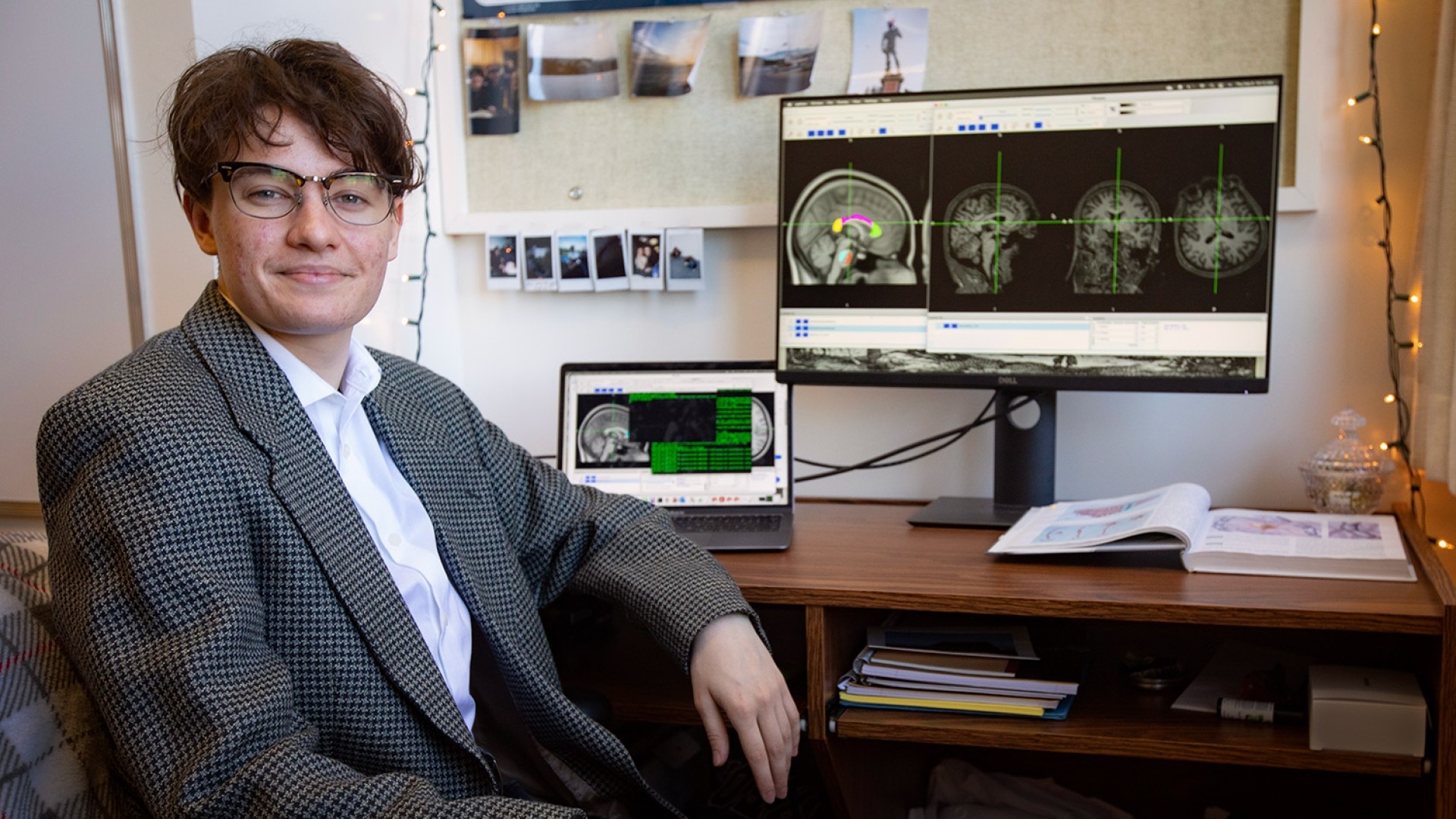
Contributing to our Health -- A Series About StFX Research Making A Difference In Our Communities
StFX is a leader in health innovation and entrepreneurship in Nova Scotia. In this ongoing series, we proudly shine a spotlight on our health research leaders, research and community health partnerships and their impact. For more on the Contributing to our Health series, click the link below.
Contributing to our Health series
“I hope that this work and similar projects will bring a heightened awareness as to how prevalent these impairments are for some individuals with schizophrenia, and to keep these impairments in mind when tailoring resources and supports for those who need them the most.” ~ StFX student Ethan Draper
Meet StFX student Ethan Draper: Researching the role of the brain's white matter in schizophrenia
Ethan Draper, a fourth year honours student at StFX completing a Bachelor of Arts in Applied Forensic Psychology, is researching the role of the brain’s white matter in schizophrenia.
Working under the supervision of StFX psychology professor Dr. Erin Mazerolle for his honours thesis, Mr. Draper is using brain imaging tools (functional magnetic resonance imaging or fMRI) to explore white matter abnormalities in individuals with schizophrenia compared to healthy controls.
“White matter is the connective tissue in the brain, and so when impairments to it are present, it can have impacts on someone’s cognitive abilities (such as their attention and working memory),” says Mr. Draper, who was born in Ottawa, ON, but now lives in Fredericton, NB.
“This has a lot of functional implications, such as how someone is able to maintain housing, and job/financial stability. I am using freely available data acquired from a lab in America to look at the connectivity of white matter during a working memory task.”
Mr. Draper says since StFX doesn’t have a neuroscience program, getting started wasn’t as clear cut as some of his previous research projects have been. “I’ve been incredibly fortunate to work with Dr. Mazerolle on some other projects, including work about the neuroscience of housing instability, so this felt like a logical extension of some of my long-term career goals. I’ve always been intrigued by brain imaging, but never had the opportunity, or even fathomed it was something I could do, before I began working with her.
“All of it is incredibly exciting to me. I’m particularly excited to be conducting a replication using freely available data, which bridges a lot of my academic values. I’m also excited to be specifically exploring white matter, given that it’s been historically under researched using fMRIs.”
Mr. Draper says for a long time he’s had an interest in the brain associated conditions overrepresented in individuals experiencing housing instability, specifically schizophrenia.
“I hope that this work and similar projects will bring a heightened awareness as to how prevalent these impairments are for some individuals with schizophrenia, and to keep these impairments in mind when tailoring resources and supports for those who need them the most. So from a housing perspective, this can involve being cognizant of the general inaccessibility of intake forms, and improving them to make them more accessible to individuals with working memory impairments. Overall, when accommodations are made, they tend to benefit many more people than just the ones they were designed for.
“This is pertinent for Nova Scotians particularly, since it’s become highly apparent that there is a serious housing crisis in this province.”
The experience gained as a burgeoning researcher has been hugely beneficial, he says.
“Learning computer coding has been a phenomenal experience for developing my academic resilience, as it is leagues out of my comfort zone. So I’ve been very excited to push myself, try something new, and learn to problem solve in a very different way,” he says.
“This opportunity has been unparalleled. I have benefited immensely from my experiences working with Dr. Mazerolle, gaining the skills necessary to conduct fMRI research, and it has further instilled in me a passion to continue this work at the graduate level,” he says.
Following his time at StFX, he aims to have a career in research centered around public change with emphasis on making housing accessible to individuals with cognitive impairments. Specifically he hopes to conduct research addressing important questions such as: how do psychosis-related cognitive impairments affect job and housing stability? How can psychosocial interventions be created with these impairments in mind?

